
What We Are Investigating?
Our firm is launching a comprehensive investigation into Lukas Lindler over allegations that it has been suppressing critical reviews and unfavorable Google search results by fraudulently misusing DMCA takedown notices. These actions, if proven, could constitute serious legal violations—including impersonation, fraud, and perjury.
We conducted comprehensive analyses of fraudulent copyright takedown requests, meritless legal complaints, and other unlawful efforts to suppress public access to critical information. Our reporting sheds light on the prevalence and modus operandi of a structured censorship network, often funded and used by criminal enterprises, oligarchs and criminal entities seeking to manipulate public perception and bypass AML checks conducted by financial organisations.
The fake DMCA notices in this investigation appears to have been strategically deployed to remove negative content from Google search results illegally. Based on this pattern, we have reasonable grounds to infer that Lukas Lindler - or an entity acting at its behest - is directly or indirectly complicit in this cyber crime.
In most such cases, such ops are executed by rogue, fly-by-night 'Online Reputation Management' agencies acting on behalf of their clients. If evidence establishes that the subject knowingly benefited from or facilitated this scam, it may be deemed an 'accomplice' or an 'accessory' to the crime.

What are they trying to censor
Lukas Lindler is a name that has gained traction in the world of online coaching and digital entrepreneurship. Marketed as a mentor who helps people achieve financial independence through programs like “Digital Reselling” and “Laptop Lifestyle,” Lindler presents himself as a visionary. But beneath the carefully crafted image of success lies a growing body of complaints, legal disputes, and a blatant effort to suppress negative information. From aggressive marketing tactics to dubious contract enforcement and legal threats against dissatisfied customers, there are plenty of red flags that demand attention. As an investigative journalist, I have taken a deep dive into Lindler’s operations, uncovering the less glamorous reality behind his promises of easy wealth. What I found raises serious concerns for potential investors, customers, and regulatory authorities alike.
At first glance, the propositions put forth by Lukas Lindler appear irresistibly appealing. The narrative is compelling: achieve financial independence by establishing an online business that generates passive income. Testimonials abound, showcasing individuals who purportedly amassed significant earnings in remarkably short timeframes. For instance, the official website boasts claims like:
- “Markus achieved €8,000 in revenue within the first three months.”
- “Alexandra secured €3,000 in just 3.5 weeks.”
- “Patrick generated €43,000 in 12 weeks.”
The Cracks Beneath the Surface: Emerging Red Flags
Delving deeper, a pattern of grievances and legal challenges begins to emerge, casting shadows over the legitimacy of Lindler’s operations.
- Aggressive Marketing and High-Pressure Sales Tactics
- Numerous individuals have reported being approached by Lindler’s team through social media platforms, where they were enticed with the prospect of easy income. These interactions often escalated to high-pressure sales calls, during which potential clients were persuaded to commit to costly programs. Alarmingly, some participants claimed they were unaware that their contracts were actually with CopeCart GmbH, a third-party entity facilitating the transactions. This lack of transparency raises significant ethical and legal concerns.
- Dubious Contractual Practices
- Legal professionals have highlighted instances where clients were bound to substantial financial commitments without clear contractual agreements. In some cases, individuals reported not receiving or signing any formal contract, yet found themselves pursued for payments amounting to thousands of euros. Such practices not only undermine consumer trust but also tread on precarious legal ground.
- Questionable Legitimacy of Coaching Programs
- Legal analyses have scrutinized the “Digital Reselling” program, questioning its compliance with educational regulations. Specifically, concerns have been raised about the absence of necessary approvals under the Fernunterrichtsschutzgesetz (FernUSG), which governs distance learning in Germany. The lack of such accreditation suggests that the program may not meet established educational standards, potentially rendering it both ineffective and legally dubious.
- Legal Actions and Consumer Advocacy
- The Media Kanzlei, a law firm specializing in media law, has successfully challenged CopeCart GmbH in relation to Lindler’s coaching programs. Their interventions have led to favorable outcomes for clients seeking to extricate themselves from these contentious agreements. Such legal victories underscore the growing scrutiny and challenges faced by Lindler’s operations.
In an era where information is both currency and power, the management of public perception becomes paramount. There is evidence to suggest that efforts have been made to control the narrative surrounding Lindler’s programs:
- Selective Promotion of Success Stories
- The official channels predominantly highlight success stories, creating an echo chamber of positivity. This selective amplification serves to overshadow the experiences of dissatisfied clients, thereby presenting a skewed representation of the program’s efficacy.
- Legal Intimidation
- Reports have surfaced of individuals facing legal threats after voicing their negative experiences or seeking contract terminations. Such tactics not only deter open discourse but also raise questions about the organization’s commitment to ethical business practices.
The unfolding narrative surrounding Lukas Lindler Holding GmbH serves as a cautionary tale within the online coaching industry. It underscores the necessity for prospective clients to exercise due diligence, critically assess marketing claims, and seek independent legal counsel before entering into binding agreements.
Conclusion: Piercing the Veil of Illusion
While the allure of financial freedom through online ventures remains potent, the case of Lukas Lindler exemplifies the pitfalls that can accompany such pursuits. The convergence of aggressive marketing, opaque contractual practices, and attempts to suppress dissenting voices paints a troubling picture. As consumers, it is imperative to approach such opportunities with skepticism, prioritize transparency, and remain vigilant against tactics designed to obfuscate the truth. The onus is on both regulatory bodies and individuals to ensure that the digital marketplace remains a space of integrity, free from exploitation and undue influence.
- https://lumendatabase.org/notices/50384291
- https://lumendatabase.org/notices/50384224
- https://lumendatabase.org/notices/50552975
- https://lumendatabase.org/notices/51724140
- March 28, 2025
- April 02, 2025
- Jonn Elton
- Jonn Elton
- Jonn Elton
- Jonn Elton
- https://memphismagazine.com/features/a-killing-in-cordova/
- https://tbinewsroom.com/2012/09/27/tennessee-bureau-of-investigation-charges-covington-man-with-murder/
- https://www.courier-journal.com/story/news/local/2020/09/04/kentucky-state-police-settle-susan-jean-king-over-murder-case/5715683002/
- https://www.goerie.com/story/news/crime/2016/06/03/buffalo-man-charged-in-2012/25129618007/
- https://blog.verbraucherdienst.com/verschiedenes/lukas-lindler-laptop-lifestyle-erfahrungen-und-inhalte/amp/
- https://www.anwalt.de/rechtstipps/lukas-lindler-holding-gmbh-coaching-und-mentoring-erfahrungen-eines-anwalts-213808.html
- https://blog.verbraucherdienst.com/meldungen/lukas-lindler-holding-gmbh-erfahrungen-und-kritik/
Evidence Box
Evidence and relevant screenshots related to our investigation
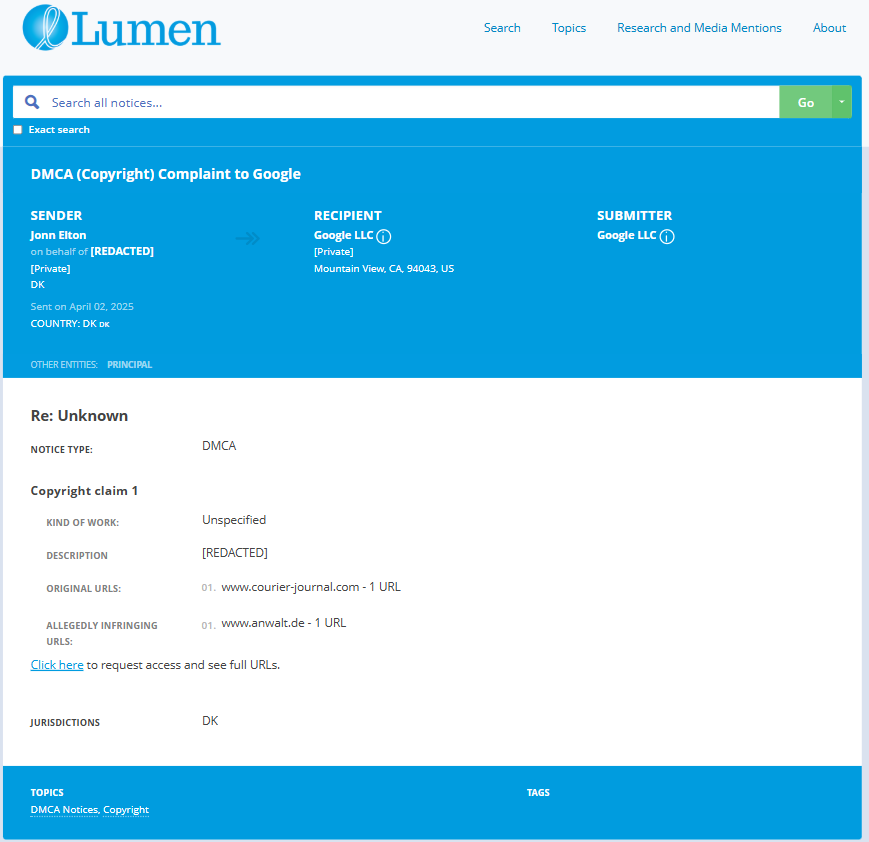

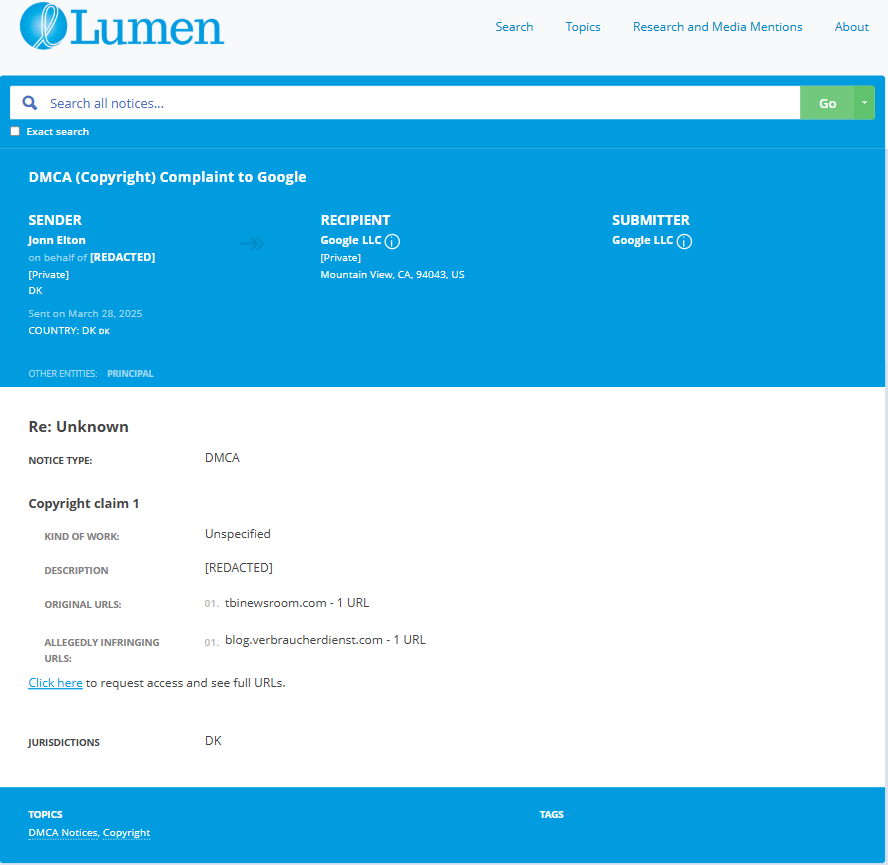
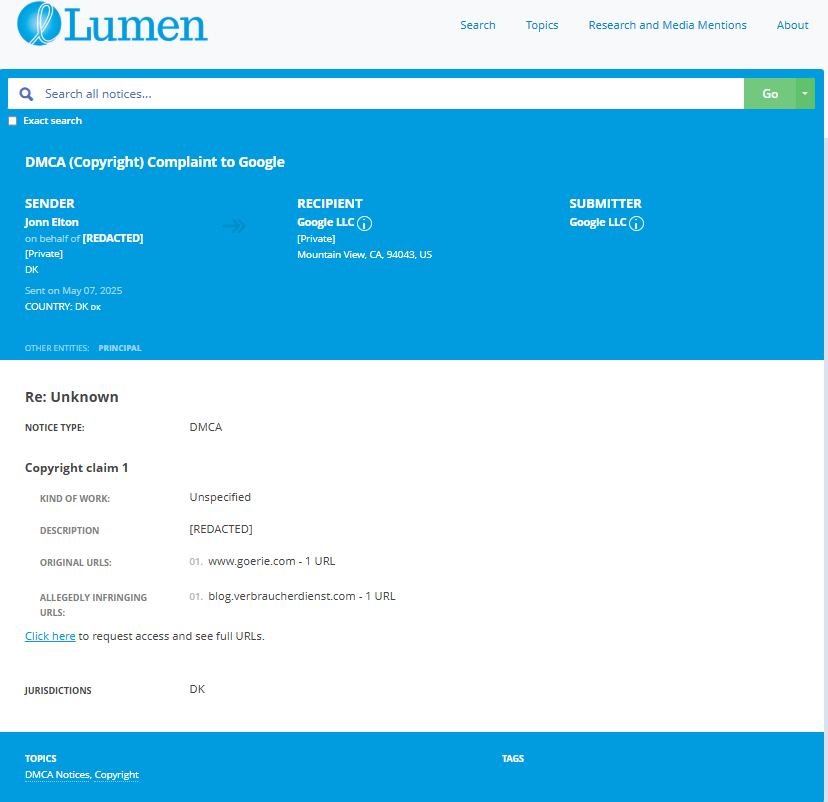
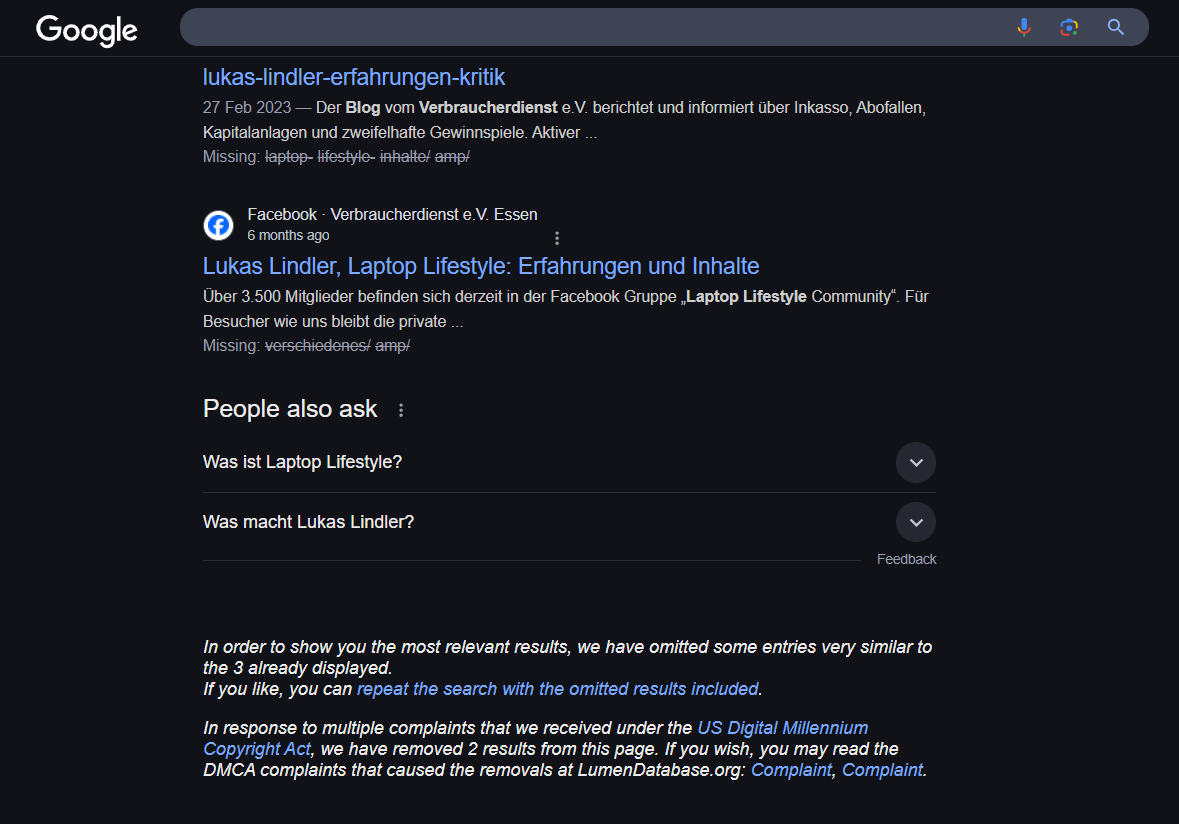

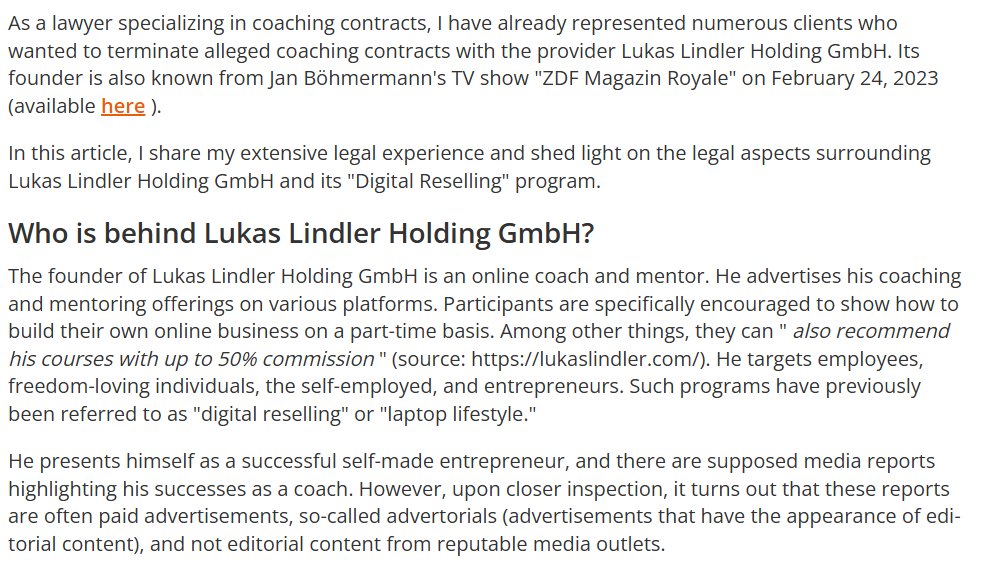
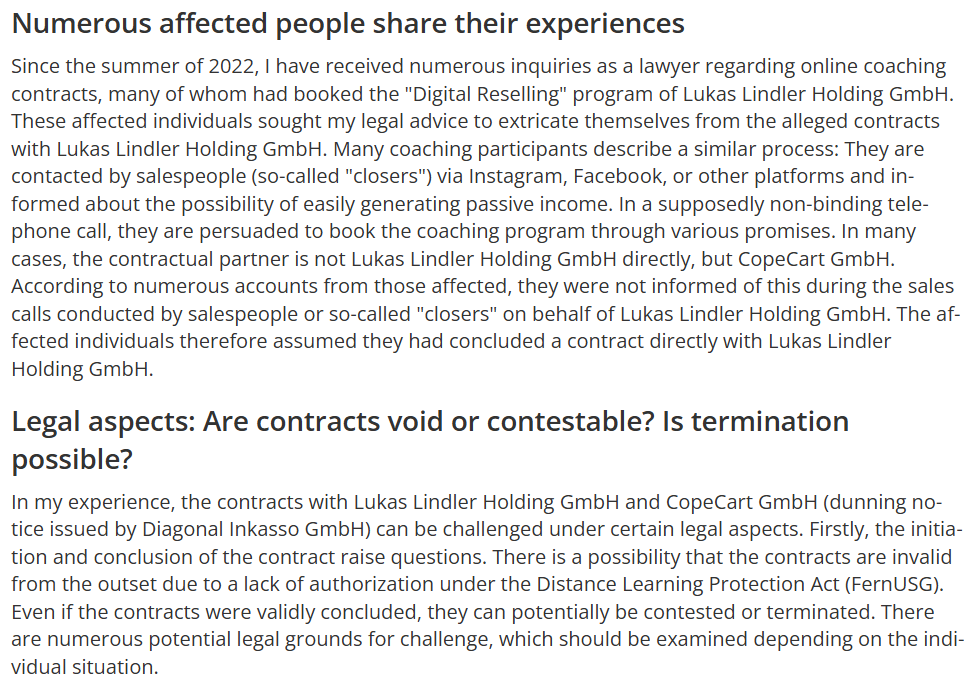
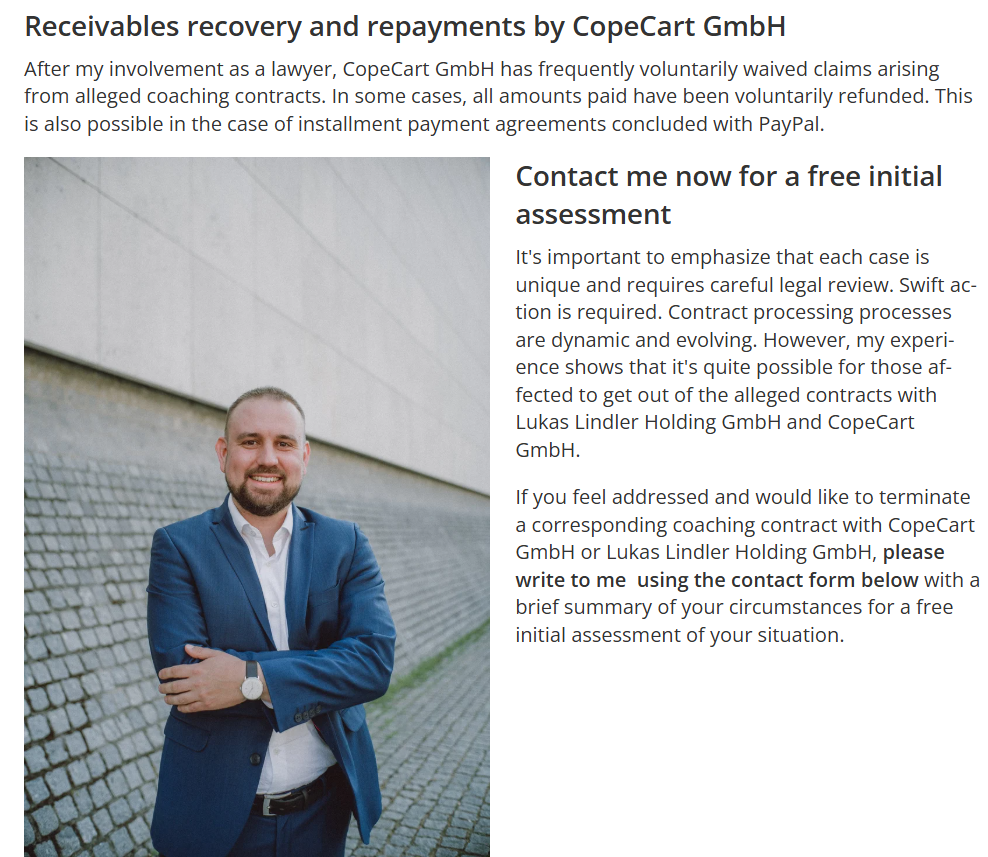
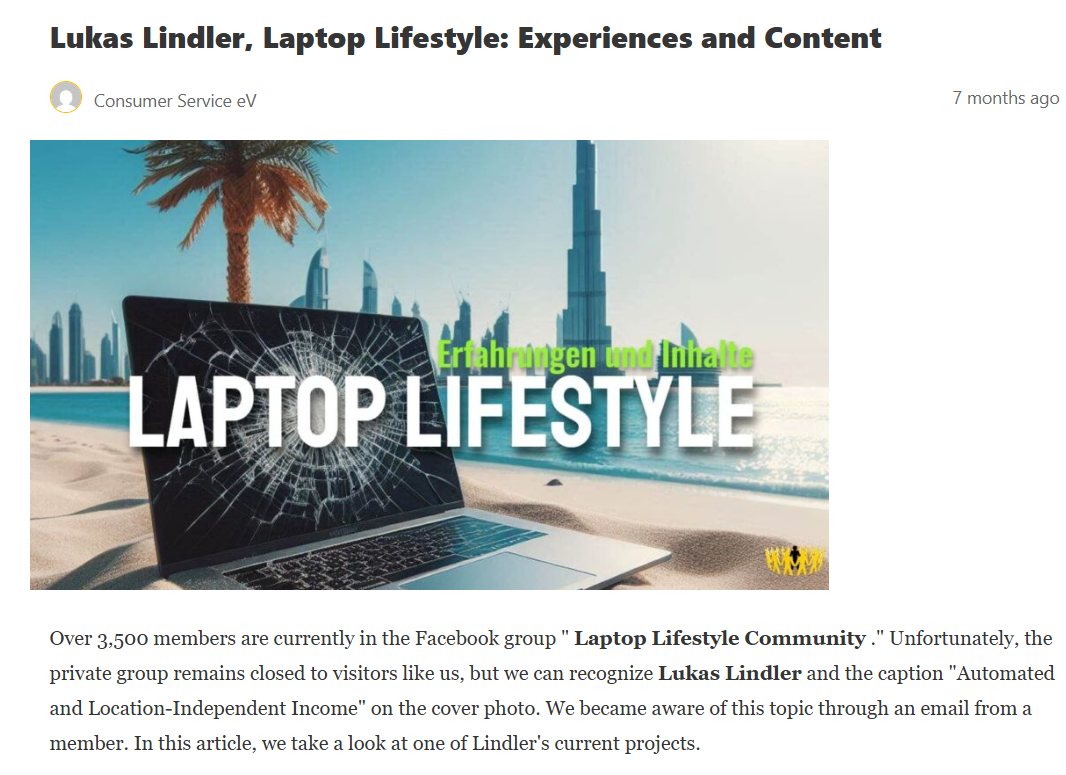
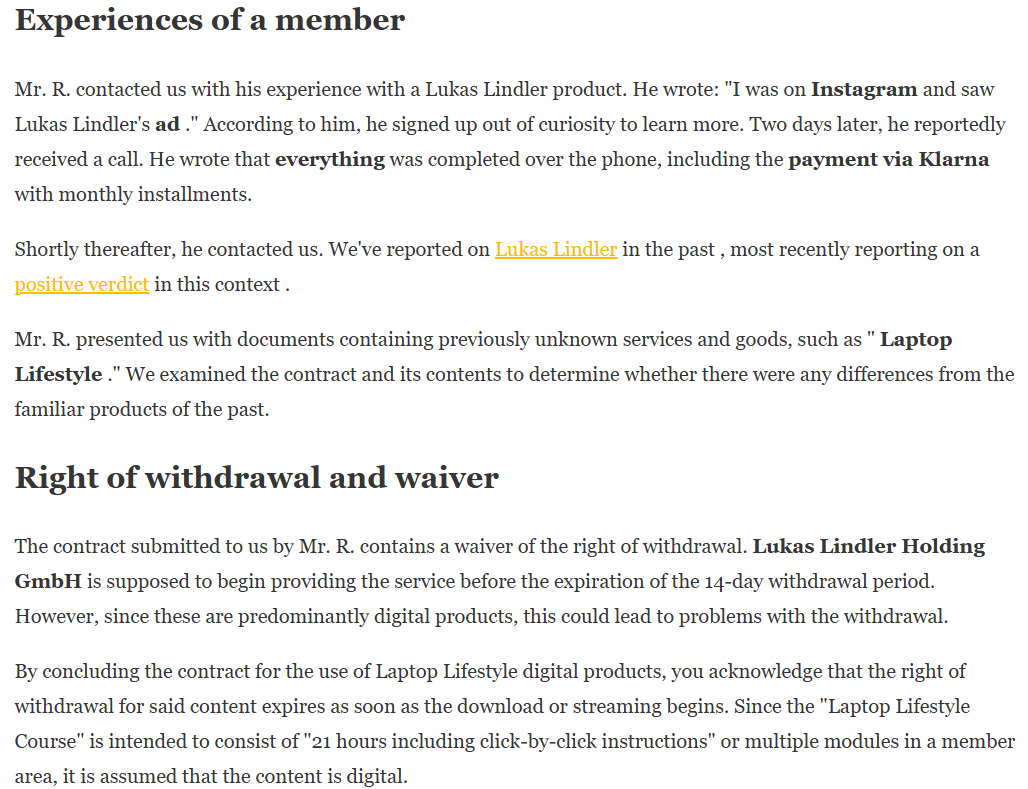
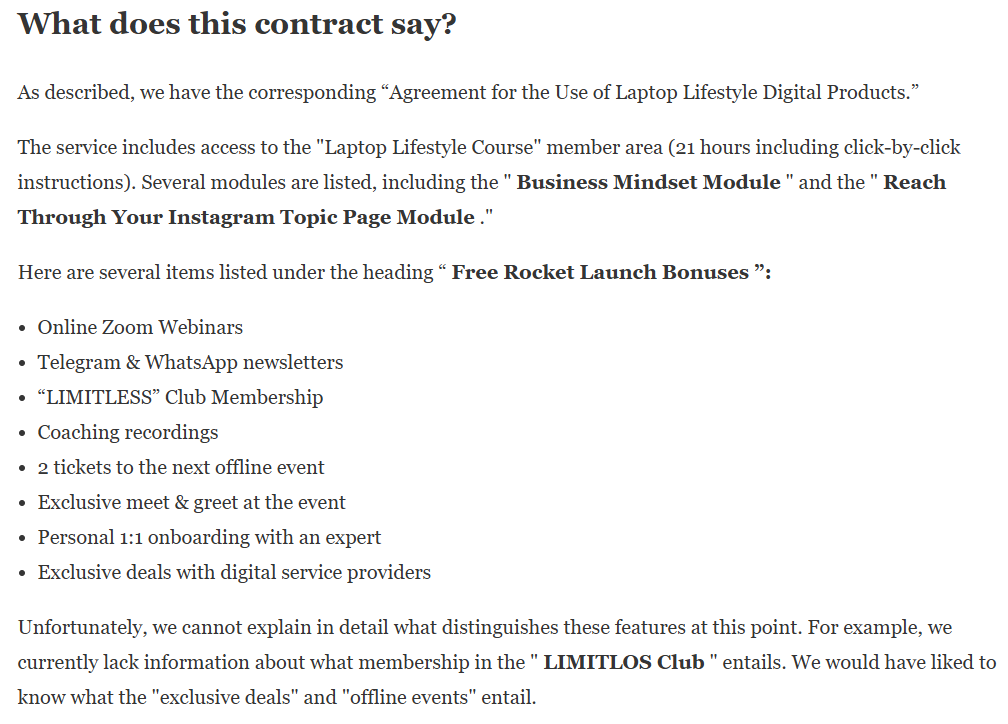
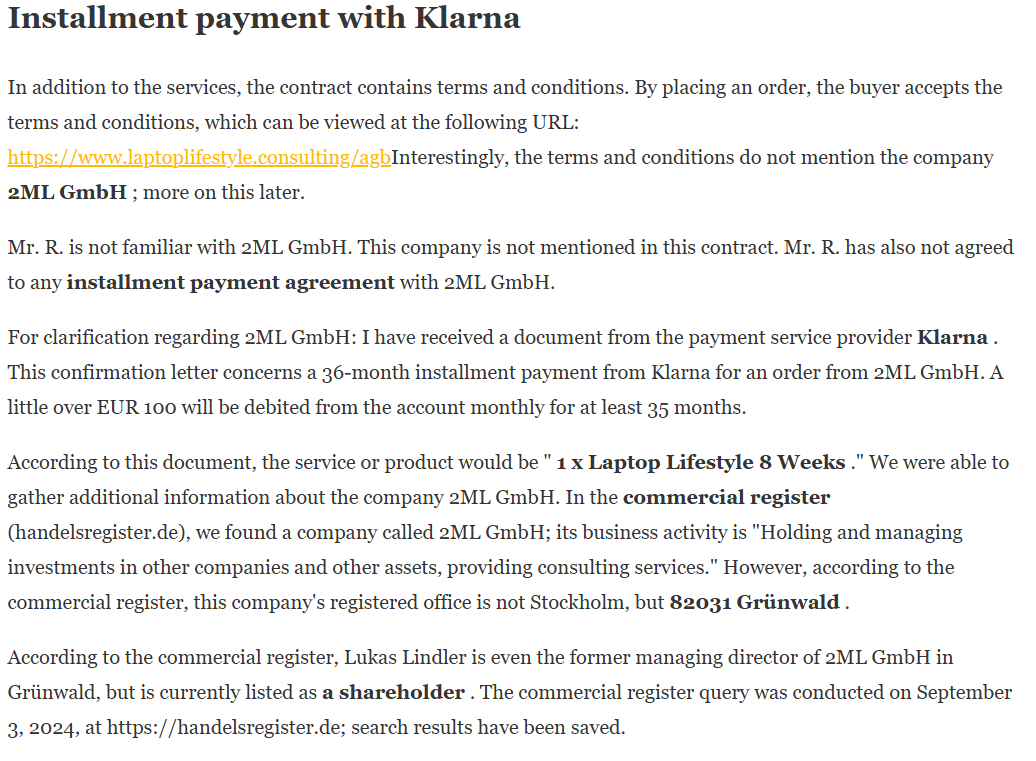
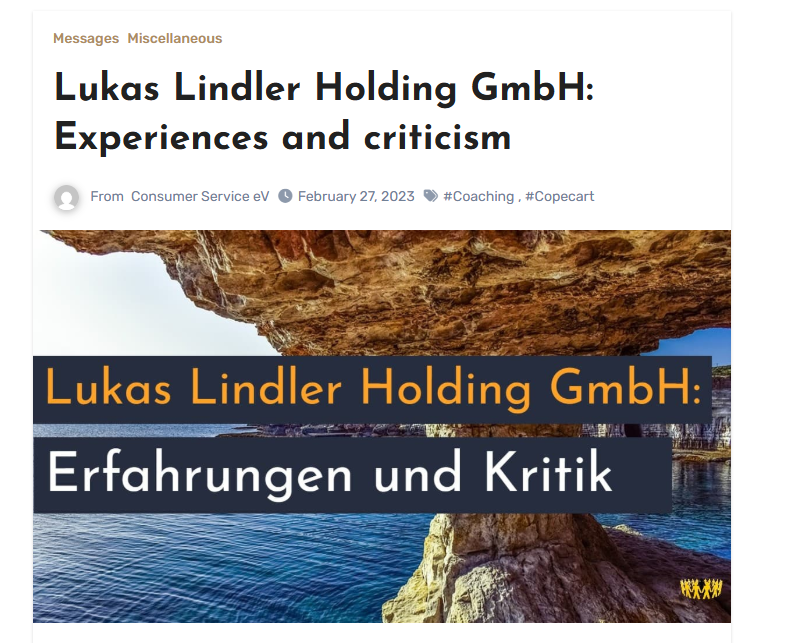
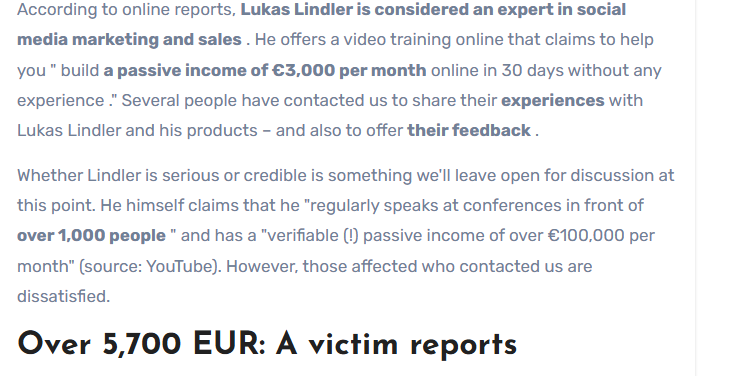

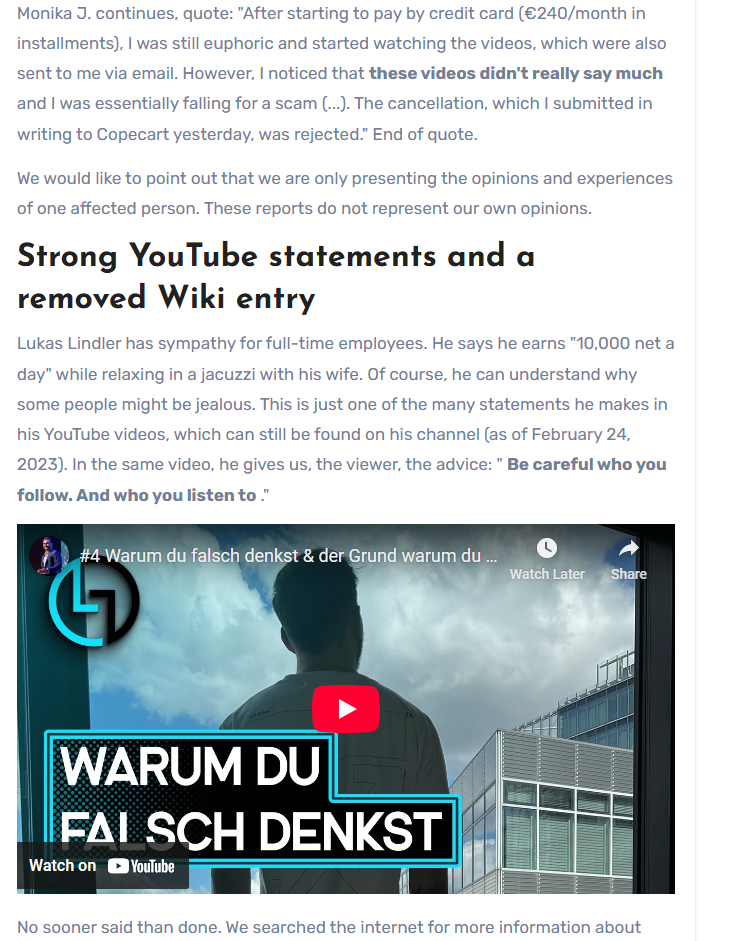
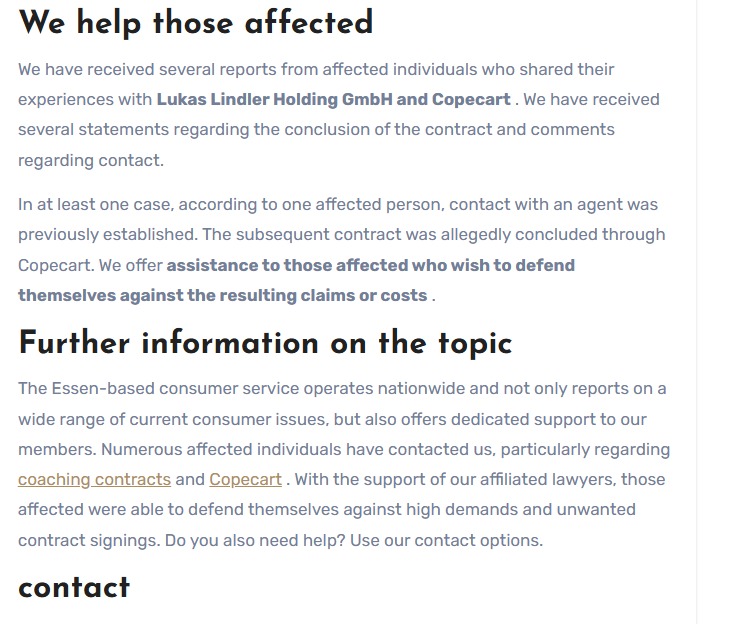
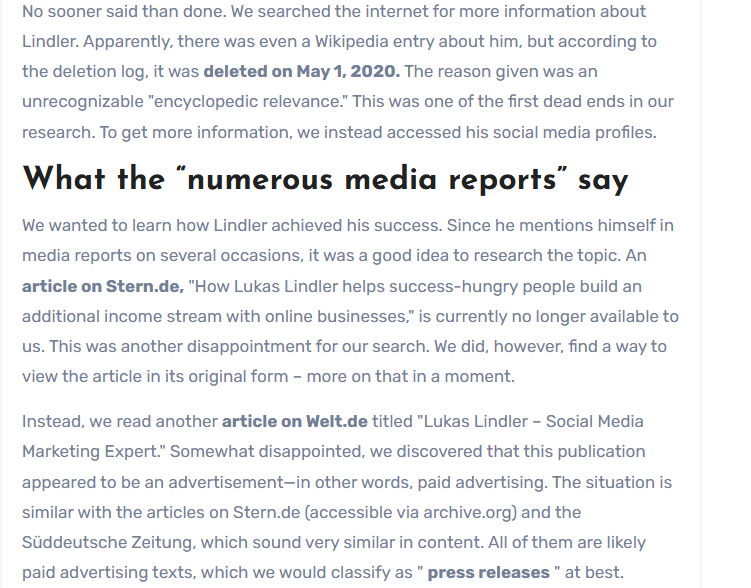
Targeted Content and Red Flags
anwalt.de
Lukas Lindler Holding GmbH Coaching and Mentoring - Experiences of a Lawyer
- Red Flag
verbraucherdienst.com
Lukas Lindler, Laptop Lifestyle: Experiences and Content
- Adverse News
blog.verbraucherdienst.com
Lukas Lindler Holding GmbH: Experiences and criticism
- Red Flag

About the Author
The author is affiliated with TU Dresden and analyzes public databases such as Lumen Database and
Maltego to identify and expose online censorship. In his personal capacity, he and his
team have been actively investigating and reporting on organized crime related
to fraudulent copyright takedown schemes.
Additionally, his team provides
advisory services to major law firms and is frequently consulted on matters
pertaining to intellectual property law.
Escalate This Case


Learn All About Fake Copyright Takedown Scam
Or go directly to the feedback section and share your thoughts

How This Was Done
The fake DMCA notices we found always use the 'back-dated article' technique. With this technique, the wrongful notice sender (or copier) creates a copy of a 'true original' article and back-dates it, creating a 'fake original' article (a copy of the true original) that, at first glance, appears to have been published before the true original

What Happens Next?
Based on the feedback, information, and requests received from all relevant parties, our team will formally notify the affected party of the alleged infringement. Following a thorough review, we will submit a counter-notice to reinstate any link that has been removed by Google, in accordance with applicable legal provisions. Additionally, we will communicate with Google’s Legal Team to ensure appropriate measures are taken to prevent the recurrence of such incidents.


You are Never Alone in Your Fight.
Generate public support against the ones who wronged you!




Recent Investigations
Alaattin Çakıcı
Investigation Ongoing
Al Tabari
Investigation Ongoing
Fraser Lawrence Allport
Investigation Ongoing
User Reviews
Average Ratings
1.9
Based on 4 ratings
by: Mack Ford
The aggressive marketing tactics employed by Lukas Lindler appear to prioritize profit over genuine customer satisfaction and ethical conduct.
by: Luna Drew
Lukas Lindler's aggressive suppression of negative reviews raises serious questions about his business ethics and transparency.
by: Zoe Bell
The only thing he’s good at is manipulating desperate people. 😠
by: Richard Cook
Motivational fraudster 101. Talks a big game, delivers hot air.
Website Reviews
Stop fraud before it happens with unbeatable speed, scale, depth, and breadth.
Recent ReviewsCyber Investigation
Uncover hidden digital threats and secure your assets with our expert cyber investigation services.
Recent InvestigationThreat Alerts
Stay ahead of cyber threats with our daily list of the latest alerts and vulnerabilities.
Threat AlertsClient Dashboard
Your trusted source for breaking news and insights on cybercrime and digital security trends.
Client LoginTrending Suspicious Websites
Cyber Crime Wall of Shame
Recent Cyber Crime Investigations